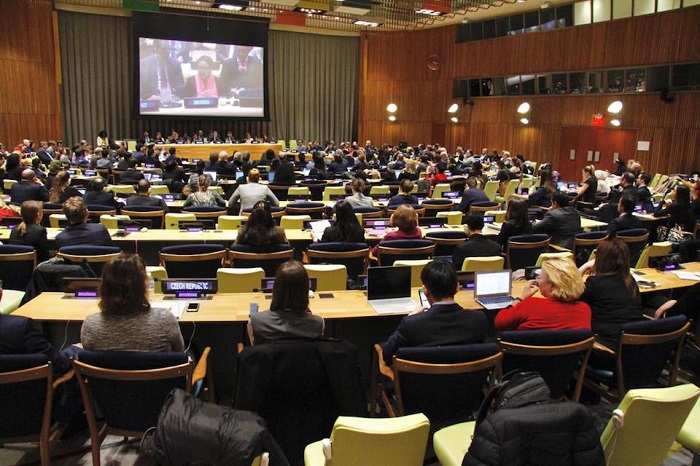Statement by Lord Tariq Ahmad of Wimbledon, Minister of State for the Commonwealth and the UN at the Security Council Arria Formula Meeting on Women, Peace and Security
Your Excellencies, ladies and gentlemen, good afternoon and welcome. I’m delighted that we’re working very closely with many in this room. But in hosting this event today, in particular, paying tribute to our close cooperation with both Germany and Peru and colleagues across the world on the important agenda of Women, Peace and Security both through the informal Experts Group and in the Security Council. So it’s an immense pleasure to be co-hosting this Arria meeting today. And thank you, Foreign Minister, for your introductory remarks.
As we’ve heard from the Foreign Minister, next year will mark the 20th anniversary of when the UN Security Council resolution 1325 was passed. It was a landmark resolution. It set the course for the agenda that we all meet for today on Women, Peace and Security at the UN. If 1325 sets out the destination, then the national action plans are the means of getting there – providing country specific, tangible strategies that can drive public and political action, and drive the important priority of gender equality and most importantly lasting peace. In countries suffering the effects of unresolved conflicts, the voices of women can make a real difference. Actually let’s change that. They do make a real difference. Survivors and grassroots organisations need to be allowed better connections with national politics and to be able to contribute directly to building peace. That cannot in any sense be ignored.
Five years ago, your excellencies, ladies and gentlemen there was not a single National Action Plan in the MENA region. Today we can reflect and I am pleased to say there are four: in Iraq, in Jordan, in Tunisia and in the occupied Palestinian territories. And they will soon be joined by Lebanon. However the unresolved conflicts across the MENA region continue to demonstrate the chronic challenges of implementing the WPS agenda in conflict settings. As we heard from Heiko, we have a humanitarian crisis in the MENA region. We can look to Yemen’s protracted conflict and Syria. Absence of political stability in Libya and yes the legacy of the awful legacy of Daesh atrocities in Iraq. I also visited Mosul. I visited Iraq together with Special Representative of the Secretary-General Pramila Patten and went to Mosul and heard first-hand about the suffering of minority communities – particularly Christians and the Yazidis. And I had the honour last week to host Nadia Murad in London, where I heard directly about the sterling work she was doing. And not only having endured the atrocities of this despicable organization -that hijacks a noble faith- Daesh, not just surviving it but then having the courage to become an advocate. And I am sure we all recognise and pay tribute to her efforts which were rightly recognised through the award of the Nobel Peace Prize.
Your Excellencies, when we look at what’s happening across the MENA region – directly or indirectly increase sexual and gender based violence. We’ve seen that it disproportionately affects women and girls and it creates barriers to their full participation. Therefore National Action Plans need to address the diversity of the countries and the regions they serve. Understanding the immense complexities and most importantly addressing these challenges. Under our own National Action Plan, the United Kingdom has prioritised support to key countries including Iraq, Syria and Libya. And implementing these National Action Plans requires a threefold approach. The first: is state level support and we are pleased to be funding UN Women to support the implementation of the Jordanian National Action Plan through our Conflict, Stability and Security fund. The government endorsed plan will integrate a gender based approach towards women’s participation in prevention and protection processes as well as importantly in peace building. The second aspect, again as the Foreign Minister mentioned, is civil society. Women-led groups are at the forefront of efforts to build peace across the MENA region, and they must be rightly recognised but also importantly they must be protected. That is why we are helping to build the capacity of civil society organisations in Iraq through the Women’s Peace and humanitarian fund and have also supported women’s organizations in Libya and indeed in Yemen.
The final crucial aspect relates to the international community – that is all of us. Our collective, collaborative shared responsibility to provide technical, financial and logistical support to governments and civil society organisations, in order to achieve our shared vision and goals on inclusivity on the agenda that is women peace and security. For our part, the United Kingdom pledges to continue to support this agenda in every which way we can, including through our own National Action Plan. In the Security Council, we must do more to ensure the existing Women, Peace and Security framework is further implemented more meaningfully. The informal Experts Group is an important forum to monitor and indeed encourage implementation but we must also continue to hear directly from civil society briefers, from the United Nations who can illustrate progress and most importantly highlight areas where we must continue to apply our collective efforts and support.
In conclusion and mindful once again of next year’s anniversary, I urge all of us together today to join in implementing and developing further National Action Plans in full consultation with our civil society partners. So that together we support others to implement theirs. And together we can strengthen our resolve in promoting the Women, Peace and Security agenda in all our work – in both conflict and stability and in building peace. Thank you.










